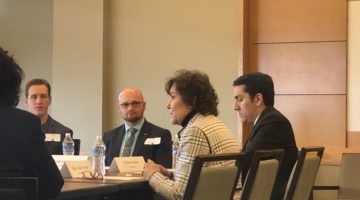It’s something that has an extraordinary winning record and nearly invincible in federal and state governments year after year. Not much has been done to stop it, and, by the looks of it, it won’t be stopped any time soon. What is this unrelenting force, you may ask? The answer: money. And it’s discouraging young leaders all over the country to run for office.
America’s politics have been dominated by money for decades, but have seen a particularly large spike since the late 1990s. According to the Center for Responsive Politics, spending on federal elections has increased from $1.6 billion in 1997-1998 to $6.3 billion in 2011-2012. In the 2014 midterm elections, which traditionally yield less money than a year when candidates are gearing up for presidential races, nearly $4 billion was spent on federal congressional campaigns, and an increasing amount of this money has come from undisclosed donors.
While some of the money comes out of candidate’s pockets and from individual donors, the majority comes from organized Political Action Committees, which feed donations into specific candidates who support their values or legislative needs. This doesn’t just happen at a federal level, however; PACs feed money into state elections too.
This was evident in a few notable Nevada election races in the November 2014 election cycle, particularly the race for Attorney General, where Republican Adam Laxalt (who has a long family history in Nevada politics) narrowly defeated outgoing Secretary of State and Democrat Ross Miller.
All of this doesn’t even take into consideration congressional earmarks, in which lobbyists and PACs promise money for the campaign of candidates who vote in favor of their preferred policies. Yes, there is proof out there that people are, literally, buying congressional votes.
Many have advocated for caps on campaign spending, but the Supreme Court has often ruled against reform measures. I don’t necessarily believe that this is a partisan issue, but Republicans know that money is in their favor, and in a Republican-controlled Congress, there are unlikely to be any significant reforms in campaign finance.
This probably strikes most people as wrong; it doesn’t seem fair for people to essentially purchase “power” on their credit card. Most people would think that representatives should consider the will of their people more than seat security when making their decisions; and politicians should be elected on merit, not money.
It’s one thing for a fictional television show such as “House of Cards” or “Scandal” to portray these issues for entertainment purposes. But when the actions of fictional (and Machiavellian) characters such as Frank Underwood draw comparisons to real-life politics in the United States, corruption has probably gone a step too far.
The problem that people don’t talk about, however, is how this inherit greed in America’s political system turns off young leaders who would be interested and could be influential in afflicting necessary change in American society.
I’m one of them.
I am devoutly dedicated to public service and have been for a long time. From student council races in elementary school to my leadership positions in high school and college, I have always strived to give back to people through the form of government.
Nonetheless, I know that I’m not the only one that simply couldn’t, and wouldn’t, compromise their values in order to move on to the next level of influence or power.
Others feel differently. And they make valid points — one doesn’t have to give in to interest groups in order to get elected. Ideally, one could be such a qualified candidate that the voters would elect them regardless of how much money they threw in to the campaign.
But for myself, and many others who wish to move, shake and shape the future of America, we’ll find other ways to do it.
Caden Fabbi studies political science. He can be reached at dcoffey@sagebrush.unr.edu and on Twitter @TheSagebrush.













